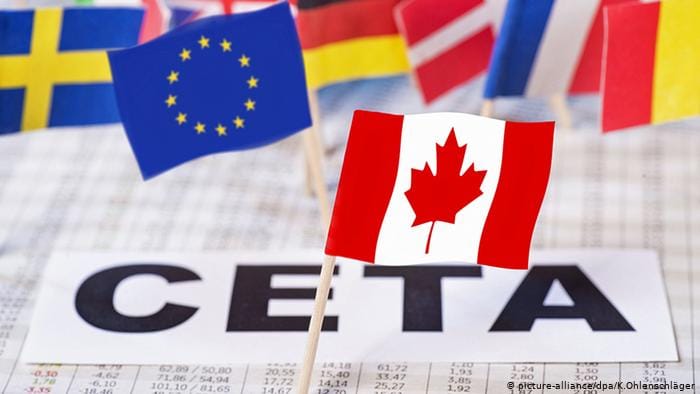What is CETA?
Comprehensive Economic and Trade Agreement. It is the trade agreement negotiated between Canada and the EU. Most of it, 97%, relates to tariff free trade between the two. Trade is solely in the control of the EU Commission and individual countries cannot influence the policy, other than in discussion in the EU Council. The trade aspects of CETA are already in operation since 2017. However, the Investor State Dispute settlement is not.
What is ISDS?
Investor-state dispute settlement (ISDS) or investment court system (ICS) to give it its new name. These mechanisms have been inserted into international trade deals for many years. They allow businesses from one state to sue for loss of profit in another state named in the trade agreement. The key thing here is that a corporation can sue the state for something the state does. For example, Veolia (runs our LUAS as ‘Transdev’) sued Egypt when that state raised the minimum wage. While it actually lost that case, the case cost Egypt millions of Euro to defend. This has the effect of frightening states to give in and settle out of court. In 2012 Ecuador had to pay Occidental Petroleum $2.4 BILLION! because the company was treated ‘unfairly’.
The term ‘Court’ – this is the main problem. These investment courts are not courts in the legal sense. They are overseen by adjudicators who are not legal judges. Rather they are business consultants, with training such as in accounting. By nature, they believe that profits are good. They are not trained to support the public good, rather private profiteering.
Regulatory Cooperation
CETA includes an agreement to cooperate on harmonizing regulations between Canada and the EU, seeking to eliminate what they call ‘technical barriers to trade’, or what we might call environmental and health standards. Canada’s standards are lower than those of the EU, for example in food production. So, the cooperation committees may pressurize Europe to drop their standards, as rising Canadian standards would be… a barrier to trade! The EU has operated the ‘precautionary principle’ for many years, where the onus is on industry to prove their products are safe. This allows the EU to block a product.
Canada operates on the ‘science based approval process. This means the onus is on the government to prove the product is unsafe – a very different approach and costly to the government or EU, not the producer. If banned the producer can take a case to the ICS.
What is the ‘negative list’ in CETA?
This was the first trade agreement with a ‘negative list’ for ‘General Economic Interests (SGEI), i.e. public services. It means that all services will be subject to market liberalisation UNLESS an explicit exception is made. So a government might simply fail to cover all public services and could not add to the list later. (Germany’s list runs to 25 pages, Ireland less than a page). Worse, the EU rules about the ‘ratchet clause’ limits the reservations made by governments. To quote the EU Commission: “a ratchet clause ensures that a free trade agreement is forward-looking and remains up-to-date by capturing the unilateral liberalisation that the other party may undertake in the future.” See what we mean about EU being in favour of neo-liberal policies?
In other words, once a part of a public sector is liberalised, the government cannot reverse to full public sector in the future. CETA does not mention the precautionary principle but does commit to promote science-based approaches which result in acceptance of GMO products in Canada.
Are Eamon Ryan’s points as to why he is now supporting CETA acceptable?
ISDS has been altered
ISDS was criticized as being costly, not transparent, and inconsistent. The EU is in negotiation with other states to improve on these aspects. The system, for now, is called investment court system (ICS) and talks are continuing at UN level. But these changes are only tinkering with the operation (improving transparency, adjudicators need more specific qualifications, and decisions will be more consistent). It does not fundamentally change the right of multinational corporations (not domestic companies) to sue the state in another country for loss of profits as a result of that state’s change of policy.
Furthermore, the companies taking a case do not even have to be headquartered in a state involved in the trade deal. For example, a USA corporation with offices in Canada could sue the Irish state.
European Court found CETA to be compatible with EU law
This does not say much as the EU is generally in favour of neo-liberal policies. It restricts expenditure on the public sector and constantly tries to open them to privatization. So nothing new there.
Imagine the opposite to ISDS and CETA
ISDS allows rich people in corporations to sue the state for loss of profits. Imagine a situation where, say, unemployed people could sue the state for not improving their welfare. AND did so in a ‘court’ presided over by unemployed people. Or similar with homeless people.
Instead of a ‘negative list’ imagine that ALL public services were automatically protected from liberalisation until the parliament voted specifically on each case to allow liberalisation
Imaging the EU sticking to its precautionary principles – forever.
Not likely. Fight On!
